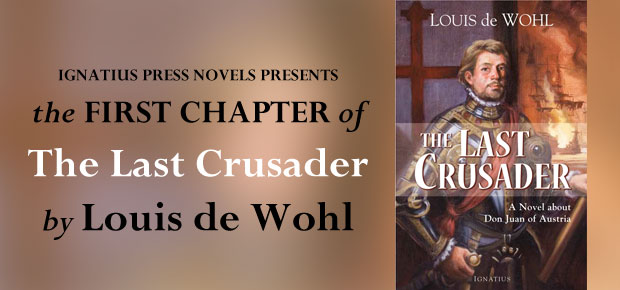Read the first chapter of the novel The Last Crusader by Louis de Wohl. If you like what you’re reading, visit the novel’s page to learn more or order!
CHAPTER 1
There was no road to Leganés, just a narrow, muddy path marked by occasional imprints of naked feet and strewn with stones—irregular, ragged, and discolored like the teeth in an old man’s mouth. The village itself, perched on a cluster of hillocks, was brooding wearily in the early afternoon sun.
When Charles Prévost saw it through the window of his carriage, he shook his large, gray head. They might have chosen a better place, he thought. But then that man Massy had been a viol player, a musician, and there was no way of understanding such people. He could have settled down in Valladolid or even in Madrid itself, though of course life there would have cost more; moreover, in the cities there was a far greater danger of meeting people who might ask questions, or worse still, get a glimpse of the—the secret. And that. . . .
A sharp knock interrupted his chain of thought—something had hit the carriage.
Charles Prévost heaved his large, fleshy body nearer the window and peered out. And then he gasped. There was an arrow sticking in the leather curtain. An arrow!
Glancing about he saw at some distance a turbaned head—and another and a third. Moors. . . .
For one wild moment Charles Prévost felt himself whirled back in time to the siege of Tunis, trumpets blaring, banners streaming in the wind and the Emperor himself roaring commands as only he could.
But then he saw that the faces under the turbans were boys’ faces and very frightened ones at that. Boys playing Moors and shooting at his carriage! His face flushed and he pulled at the silk cord the other end of which was tied to the coachman’s little finger. The carriage came to a stop.
“Just you wait”, said Charles Prévost grimly. He began to fumble at the door.
“Don’t do that”, a young, clear voice said sharply. “Please!”
The heavy man turned around. A boy was looking into the carriage from the other side, a boy perhaps seven or eight years old, fair-haired, with a pale, eager face. He was dressed in rags.
“What do you mean?” Prévost stared at him, goggle-eyed.
“You were going to interfere, weren’t you?” The boy sounded impatient. “They didn’t shoot at you—your carriage just ran into their line of fire.”
“Vaya. . .”, Prévost began to splutter. “Go away! I never. . .”
“It was bad shooting”, admitted the boy hastily. “But if you’ll stay in your carriage, I’ll avenge you.”
Prévost’s eyes narrowed. Blue eyes. Blue eyes and blond hair.
“Who are you?” he asked hoarsely.
“I am the ‘Christian’ leader”, the boy said gravely. “And this is my chance to win the battle. Stay in your carriage, please! You’ll see, I’ll win it.” He turned away and let the flap drop behind him.
Prévost blew up his cheeks. Mechanically he drew out a large silk handkerchief and dabbed his forehead. Then he lifted the flap. The “Moors” were still there—in fact there were more of them now, six, seven, a whole dozen, boys between seven and twelve, beturbaned and armed with wooden swords, slingshots, and bows and arrows.
 Still more were coming up and all of them were gaping at the carriage. Maybe it was the first they had ever seen. The countryside was poor here. A man was considered well-off if he had a donkey, and rich if he owned a mule. A carriage with two outriders, a liveried coachman, and groom was doubtless a sensation and of far greater interest to them than their game.
Still more were coming up and all of them were gaping at the carriage. Maybe it was the first they had ever seen. The countryside was poor here. A man was considered well-off if he had a donkey, and rich if he owned a mule. A carriage with two outriders, a liveried coachman, and groom was doubtless a sensation and of far greater interest to them than their game.
Prévost began to tell them what he thought of a flock of snotty-nosed urchins trying to impede his progress by shooting at his carriage, and they listened, wide-eyed and respectfully.
From somewhere a clear, sharp voice yelled: “Santiago!” and they looked up, startled, and tried to get into some kind of formation.
It was too late. A compact little troop of boys attacked them from the rear and almost as soon as they had come to grips with them a second batch came straight at them from behind the coach, led by the fair-haired boy. The “Moors” broke and ran, hotly pursued by the “Christians”.
Charles Prévost began to chuckle. Then he pulled twice at the silk cord and the carriage rumbled on toward Leganés. After a few minutes the first houses stared at it with the eyes of all their inmates. Doors began to fill. Dogs barked madly at the horses.
When Prévost saw an old priest passing, he leaned out of the window and took off his hat. “Good morning, Reverend Father”, he said courteously. “Will you tell me where I can find the house of Señor and Señora Massy?”
The priest was at least eighty years old, and his cassock not very much younger. He looked like a scarecrow, but he bowed like a grandee.
“I am Padre Bautista Vela, at your service. Señor Francisco Massy died some years ago. I closed his eyes. May God rest his soul.”
“Amen”, said Prévost, crossing himself. “And the Señora?”
“I shall lead you to her house. If you will kindly order your coachman to follow me. . .”
“Why don’t you ride with me?”
The old priest gave the horses a worried look. “If you will forgive me, Excellency, I would rather walk. It is only a stone’s throw away.”
He walked on, a long, lean, wobbly figure, a shadow with a life of its own.
The house of Señora Massy was a ramshackle, sun-baked building. A few hens fled, cackling, as the carriage approached. The street began to fill with people, quiet, solemn-faced villagers who gaped at the unusual sight just as the “Moors” had done.
A woman appeared in the door. She was in her late forties, but her face showed vestiges of former beauty and her simple dress was clean. She paled and began to tremble. The priest went up to her and mumbled something. She did not seem to hear. She stared at the carriage and at the large man now dismounting with the help of the groom.
No one here had ever seen such a man before. The villagers gazed enraptured at the flowing white moustachios, the carefully kept, pointed beard and the glorious bottle-green of his dress.
“Señora Ana Massy?” asked Prévost, and once more he took off his hat. “I am Charles Prévost, a servant of His Majesty the Emperor.”
The woman bowed her head. Perhaps it was a gesture of respect, but it looked more like the acceptance of a sentence. She beckoned the visitor to enter the house. After a moment of hesitation the old priest followed them and closed the door behind him.
The house was no better and no worse than any other in Leganés. Prévost was offered the best chair and a tin goblet of wine. He accepted both, took a cautious sip, and cleared his throat.
“Señora Massy, I suppose you know why I have come.” The woman said nothing.
Prévost pursed his lips. He drew a document from the inner pocket of his coat, unfolded it carefully, and began to read, very slowly, in a dry, businesslike voice.
“ ‘I, Francisco Massy, viol player to His Majesty, and Ana de Medina, my wife, acknowledge that we have received a son of the Señor Adrian de Bues, groom of His Majesty’s chamber, whom we have taken at his request that we should bring him up as if he were our own son, and that we should not tell any person whomsoever whose son he is, because the said Señor Adrian desires that neither his wife nor any other person should by any means know of the child, or hear him spoken of. Wherefore, we swear and promise that we will not tell or declare to any living person whose the said child is, until the said Señor Adrian shall send us a person with this letter or come in person; and we acknowledge to have received from the said Señor Adrian for the first year the sum of one hundred crowns. And henceforth the said Señor Adrian is to give us fifty ducats for every further year of the boy’s maintenance. Done at Brussels on the thirteenth day of June, Anno Domini one thousand five hundred and fifty.’ ”
Prévost carefully folded the document and returned it to his pocket. Only then did he look up. “I trust this will suffice to establish my identity and the purpose of my visit to you. Where is the boy, Señora Massy?”
“He . . . he’ll be home soon”, stammered the woman. “It’ll be time for his evening meal.” She gulped. “You have come . . . to inquire about his progress?”
There was little hope in her voice. When the blow fell, it was no more than the confirmation of her fears.
“I have come to take him with me. What he must learn now, he cannot learn here.”
Ana Massy began to cry softly. The old priest patted her shoulder. His hand, crippled and deformed by arthritis, was like that of a mummy.
Prévost produced a small silk bag. “I’ve brought another year’s payment in recognition of your services”, he said not unkindly. “Fifty ducats.”
Her eyes lit up. “So you won’t take him away at once, señor—you will leave him with me for a time . . . a little time. . . .”
“No, señora. He must leave today.”
She pushed the bag away. “I don’t want your gold.” She turned away. “He’s been . . . like a son to me. It would be like . . . selling him.”
“Selling him?” Prévost was outraged. “He’s all I have left”, she said in a trembling voice. “My husband—”
“I heard about your loss”, Prévost interposed quickly. “The good padre told me. I am sorry to have to add to your troubles, but I am under orders—we’re all under orders.”
Even now she would not accept defeat. “Surely, if his father could do without him all these years, it should not matter to him so very much if the boy stays a little longer with me.”
Prévost rose majestically. His enormous, obese figure seemed to fill the room. “Señora Massy, you do not realize your position. Adrian de Bues is a personal servant of the Emperor and my mission has been entrusted to me by the puissant Don Luiz Méndez Quixada himself, Majordomo of His Imperial Majesty. You will not presume, I trust, to resist his explicit orders.”
This time she gave in completely, with a fluttering, helpless gesture of both hands, and Prévost, not unaffected by her misery, took out his handkerchief and blew his nose. “Come, come, my good woman—it’s only for the boy’s good. Where is he?”
“Jerome is just behind you, señor”, stammered the woman. “He slipped in a moment ago.”
Prévost turned round. Seven or eight years old. Fair-haired. Blue eyes. The “Christian” leader, carrying a little harquebus.
Prévost realized that he had suspected it all the time: a boy of seven or eight—leading all the others, some of them years older and twice as strong. He smiled.
“I have come to take you with me on a journey.”
The boy looked at him from unblinking eyes. “I won the battle”, he said. “Did you see me win the battle?”
“I did.”
“Good”, said the boy. “I will come with you on the journey, but first I must eat. I am hungry.”
If Prévost was amused, he did not show it. He stalked to the door, opened it, and barked orders. The groom and one of the outriders appeared with tablecloth, linen napkins, silver, and a well-filled hamper. Prévost supervised the laying of the table and then turned once more to the boy. “The meal is served”, he announced.
The boy sat down and began to eat, as if a roast partridge, white bread, and delicious honey cakes had been his daily fare for years. But after a bite or two he asked: “Is Señora Massy not going to eat?”
Ana Massy started crying again, and at once the boy got up and walked over to her. “He said it was for my good, didn’t he?” he asked. “Why do you cry then?”
“It’s all right”, sobbed the woman. “Qu-quite all right, Jerome. Just eat your nice food.”
He obeyed without too much eagerness. Prévost carved the partridge for him with experienced hands and later changed the plates. When the boy had finished, Prévost sent the groom with silver and linen back to the carriage. “Now we must leave”, he announced quietly.
The boy nodded. Ana Massy rushed up to him and threw her arms around him. “Jerome, my sweet little Jerome. . .”
He was embarrassed, but he was moved, too. There were tears in the blue eyes. He kissed the woman’s cheeks and he bowed to receive Padre Vela’s blessing. Then he picked up his harquebus.
“No need to take anything with you.” Prévost smiled.
But Jerome marched on with his harquebus. When they emerged from the house, the street was packed with people. The whole village had assembled.
Jerome went up to a boy almost a head taller than he and pressed the harquebus into his hands. “Take it”, he said with great dignity. “It shoots fairly straight, but you must allow for the wind, of course.”
The leader of the “Moors” stood fingering the weapon. He muttered his thanks and received a quick smile in exchange.
Then the boy stepped into the carriage and Prévost followed him. The groom closed the door with a bang and rushed round to take his place beside the coachman. The whip cut through the air and with a jerk the carriage began to move, followed at once by both “Christians” and “Moors” in noisy unity.
Ana Massy rushed out of the house in a frenzy, her hair disheveled.
“My son! Jerome . . . Jerome . . . my son!. . . .”
Some of the villagers laughed, but many looked at her with compassion. The old priest caught up with her. “Control yourself, my daughter”, he murmured. “He is not your son. Do not persuade yourself that he is; it will do you no good.”
She pushed the hair out of her face. “You’re right, Padre Vela. He isn’t my son. He never was. I am just a foolish woman. But, mark my words: he isn’t the son of Adrian de Bues either.”
Padre Vela stared at her. “What do you mean?”
She laughed hysterically. “Don’t pretend, good Father. You’ve seen the way that man treated him—with respect, with more than respect—with deference. Jerome isn’t the son of Adrian de Bues, the son of a lackey. Shall I tell you who I think he is?”
The old man was afraid now. “Don’t shout, my daughter. People will hear you and. . .”
“I don’t care.” But she dropped her voice. “He is no ordinary boy, Padre. I think he is the son of a great nobleman—and from what Señor Prévost said today, I think he is the son of Don Luiz Méndez Quixada himself.”
“You have no right to accuse anyone.” For the first time the voice of the old priest sounded firm and strong. “Whoever the boy’s father was, he was first and foremost a sinner and needs God’s mercy.”
The carriage had left the village behind and was rumbling down toward the plain.
Prévost looked at the boy who was sitting beside him, erect, silent, with great, luminous eyes. “You don’t seem surprised about the turn your life has taken.”
“I’m not.”
“No!” Prévost frowned. “What do you know about your birth?”
“Nothing.”
Prévost tried again. “How is it that you are not surprised?”
The boy looked straight ahead. “I always knew this would happen one day.”
If you like what you’re reading, visit this novel’s page to learn more or order!







michaelnicholasrichard
May 18, 2015 at 1:45 pm
This is easily one of the best historical novels I’ve ever read. It is also my favorite de Wohl novel, and I’ve liked them all. There is a reason his work succeeds beyond the genre boundaries, he is simply an engaging and subtle author.